Ever since prehistoric humans began chanting, clapping, banging on logs, and blowing into bone flutes, music has been an outlet. Regardless of era, origin, skill level, or instruments used, rhythms and melodies have always been a means of expressing joy and sorrow, a way to supplicate. Primitive or modern, the aural arts have served to rally, unify, and commiserate.
But heavy music from the last few decades stands in stark contrast to that truism—or at least adds some intriguing twists to it. More than any other type of music, metal and punk (and the many sometimes-silly-sounding subgenres) aim to defy, provoke, and instigate.
There are no clear lines cleanly demarking which bands and movements embody the seismic shift from rock ’n’ roll to a new kind of heavy. Indeed, then as today, the trailblazing bands had their feet in two worlds—how could they not? Regardless, it’s safe to say the origins of punk and metal go back more than 40 years to the mid or late ’60s. And from the Stooges to Sabbath, MC5 to Maiden, Deep Purple to the Damned, Bad Religion to Bathory, and NOFX to Neurosis, headbangers and fist-pumpers have always made their mark on public consciousness by exploring the dark side of the human experience more graphically and unapologetically than any other, whether from a belligerently theatrical viewpoint or an indignant polemicist one.
Given this, it’s of course a bit ironic when razored-up punks and leather-clad metalheads become mainstream stars, their sneering faces sold posthumously on millions of t-shirts and their tunes used to sell product for corporate conglomerates. Some might argue these are small signs of progress or hope, while others see it as sad evidence of art co-opted, misunderstood, and sold out. Even more ironic, many times these travesties may not even be something the artists themselves (or their estate holders) can control. But we won’t get into a rant about publishing rights here.
As musicians, we draw inspiration and insights from these proud misfits no matter what capitalism and fickle listeners do with the rest. Still, all too often the heavies we hear from in conversations about our beloved instrument are … how shall we put it? The usual suspects. No disrespect to the guitar gods of yore—we’ve spoken to them plenty of times ourselves, and we will continue to do so—but not here. Not today.
Heavy music is about confrontation, fearlessness, defiance. And though there’s just as much imitation, banality, and corporatized bullshit in brutal, high-octane music as there is in any other genre right now, there’s also a ton of ragingly fresh and stimulating hard rock, metal, hardcore, et al coming out today. The blitzkrieg pace of change in today’s technology (and the seemingly inverse relationship with our attention spans) will probably never turn the heavy-music innovators of today into the icons of tomorrow in the same way that Ozzy Osbourne became a household name, but that can be said of pretty much everything these days. (Plus, isn’t that a good thing?)
Following in the same spirit that has always guided masters of punk and metal, we decided to sit down with some of the most innovative, unfettered—and, in the wider guitar universe, unknown—guitarists playing heavy music today. Given the breadth of subgenres, we purposely sought out players from different headspaces, though all are masters of guitar who push boundaries in ways both obvious and not. We asked them about the state of metal, hardcore, etc. today. We got the lowdown on what albums inspire them. We got them to go on record about what ills plague this deliciously dark corner of rock. We found out who they look up to, and we got them to offer up uncensored advice on how to stab stagnation and cliché in the gullet. And if you don’t like what they have to say, you can … well, these guys will tell you what you can do….
DEP daredevil guitarist Ben Weinman. Photo by Ira Chernova.
The Dillinger Escape Plan’s Ben Weinman
Mathcore icons the Dillinger Escape Plan formed from the ashes of a more straight-ahead hardcore trio that recorded a six-tune EP and signed a deal in 1997. From the beginning, DEP’s mastermind guitarist Ben Weinman has brewed a heady mix of dissonant mayhem, brain-busting time changes, and on-a-dime tempo shifts that have won them attention from many quarters, including Faith No More’s Mike Patton—who invited them to support Mr. Bungle on the road. Current vocalist Greg Puciato joined in 2000 and cemented the quintet’s fate. His relentlessly brutal vocals and ballistic stage persona fit perfectly with Weinman’s attention-getting fretboard and stage antics, which include launching himself from atop 4x12 cabs, and hanging upside-down from venue rafters—all while not missing a beat between stomping riffs and tapped clean arpeggios.
Thoughts on the State of Metal/Hardcore in 2014: Metal and hardcore are more exciting now than they’ve been since the mid ’90s. It feels like formulaic, over-produced, soulless “metal” is being seen for what it is, and an exciting resurgence of underground hardcore and metal is emerging. The underground grindcore and hardcore scenes are starting to resemble something similar in ethic to what I remember when I was coming up with Dillinger: Bands are creating music and playing shows knowing there’s no way in hell they’re ever going to be on commercial radio or played in an Apple commercial.
Best Album of the Last Year: … Like Clockwork by Queens of the Stone Age is definitely a good one. I’m a little biased on that one though, because my side project, Giraffe Tongue Orchestra, and Queens share John Theodore as a drummer and I’m super proud of the work he is doing with them.
Best Metal or Hardcore Album of All Time: That answer could change for me on any given week. Entombed’s Wolverine Blues is pretty flawless. Another great one is Beneath the Remains by Sepultura—that was both a metal and a hardcore record, in my opinion. For straight-up hardcore, you can’t go wrong with Damaged by Black Flag. The True till Death 7" by Chain of Strength has a special place in my heart, as well.
Ben Weinman's Gear
Guitars
ESP BW-1 FM/ET Ben Weinman signature models
Amps
Mesa/Boogie Mark V
Orange 4x12 cabs
Effects
Way Huge Swollen Pickle
TC Electronic Flashback
Jim Dunlop Dimebag Signature Cry Baby wah
Strings and Picks
Ernie Ball Slinky sets (.010–.046)
Dunlop .88 mm Tortex picks
Most Underrated Metal or Hardcore Guitarist: Steve Brodsky from Cave In—that dude still rips. His new project Mutoid Man is awesome.
Metal or Hardcore Cliché That Must Die: Every metalcore, mathcore, metalcore, whatevercore band uses the same exact guitar simulation tone and drum samples. Meshuggah is great, but you are not Meshuggah—stop!
Metal or Hardcore Tradition That Must Not Die: Starting a riff with just bass and then dropping the bomb when the whole band comes in and we all explode!
People Who Don’t “Get” Metal and Hardcore These Days Should…: Not make bands! If you want to be a pop band, then just be a pop band. Why scream? Why write breakdowns? Just go be in One Direction, dickhead. Metal and hardcore are about making music that—if you played it loud in your car while driving around school—98 percent of your classmates would look at you like you were possessed.
Baroness guitarist/vocalist John Baizley. Photo by Jimmy Hubbard.
Baroness’ John Baizley
Alt-metal band Baroness formed in Savannah, Georgia, in 2003, and its debut EP followed the next year. Two EPs later, vocalist/guitarist John Baizley’s quartet signed with Relapse in 2005 on the strength of their eclectic blend of melodic, old-school metal vibes mixed with post-punk, indie-rock, and occasional psych-rock elements. Their last release, 2012’s Yellow & Green—which saw Baizley and company branching even further into art-rock territory—had been out less than a month when, in August of that year, the band’s tour bus took a 30-foot plunge off a viaduct in England. Baizley went through intense physical therapy to recover from a broken arm and leg, and bassist Matt Maggioni and drummer Allen Bickle—who suffered fractured vertebrae—left the band in March of 2013. Baroness resumed touring in April.
Thoughts on the State of Metal/Hardcore in 2014: We’re in a bit of a recession. The first 10 years of the millennium were fertile for intelligent, thought-provoking music from bands like Mastodon, Botch, and Converge. But then the copycat bands got bigger and found a way to blend that with a more commercial sound and make money off it. Also, everybody is a well-trained guitar player—everybody can play circles around me. But what impressed me when I was young were bands that didn’t focus on schooling or theory. I liked the bands that experimented and just ripped up stuff. People have tons of chops, but no songwriting ability.
It’s all about how fast you can play, how far you can tweak your time signatures. When you’ve got that mindset, the rabbit hole you can fall down is very deep and very difficult to get out of. I don’t want to watch dudes masturbate. I want music to convey emotions. Watching somebody shred is kind of awesome for a minute, but then it’s tedious and boring. I’ve seen enough of that with young bands. It’s out of control. Nuance is dying in our genre, but not in others. That’s why I pay attention to the larger music world when I’m looking for something new to inspire me to write.
Best Album of the Last Year: I don’t know that I could say, “Here’s the best album of the past year,” but [Australian extreme metal band] Portal’s Vexovoid was totally amazing and intense and unique—beyond insane. It had this beautiful bark and was disgusting all at the same time. I also liked [English psych-doom band] Uncle Acid & the Deadbeats’ Mind Control.
Best Metal or Hardcore Album of All Time: I’ll just say my most-often-listened-to metal record of all time—Neurosis’ Through Silver in Blood.
John Baizley's Gear
Guitars
G&L ASAT Special
G&L Legacy HB
Custom God City Instruments 6-string
Framus Mayfield
Custom First Act
Rockbridge acoustics
Amps
Two Budda Superdrive 45 combos
Fender 1965 Twin Reverb reissue
Effects
Loop-Master switcher
Retro-Sonic Compressor
Fulltone OCD
Tym Guitars Big Mudd Ramhead
Ernie Ball passive volume pedal
Maxon AD-999 analog delay
DigiTech Whammy
Strymon Mobius and TimeLine
Mu-Tron Phasor II
Strings and Picks
D’Addario strings (.010–.049, .012–.052 for low tunings)
Dunlop Tortex .60 mm picks
Planet Waves American Stage cables
Shure KSM 313 and KSM 32 mics
Most Underrated Metal or Hardcore Guitarist: Oh man, that’s so tough! But I’ll go on record and say Kurt Ballou from Converge. He’s a total master of the instrument.
Metal or Hardcore Cliché That Must Die: This tendency towards idiocy in lyrics. Metal has become watered down. Simple tricks, simple lyrics, no focus on originality. The bands in power positions, the bands who sway peoples’ opinions on a mass scale, aren’t speaking intelligently enough. When metal was a much newer thing, the big metal bands of the ’70s and ’80s felt that the burden was on them to do something unique. Bands that were selling bundles of tickets and bundles of records had albums with content and structure and, dare I say it, thought-provoking lyrics. That has gone by the wayside in the upper echelons of metal, and it needs to come back.
Metal or Hardcore Tradition That Must Not Die: Innovation. That’s why metal has stayed a viable music form for so long, whereas other guitar-based styles have come and gone. We need to continue to treat what we do as a legitimate art form, because it is. There’s room for metal—especially on the underground side of things—to pose questions, to challenge things, to fly in the face of the status quo, to be anti-pop, but also be listenable and powerful and emotive.
People Who Don’t “Get” Metal and Hardcore These Days Should …: If you don’t get it, it’s not for you. Heavy metal did not happen because it wanted to be music for everyone. It is not meant to be easy to digest. It is meant to offer a challenge to those who want the challenge. My advice for people who are on the cusp or are seeking to be re-inspired is to go out and support local music. That’s where it’s happening in the most hungry and heartfelt way. Somewhere in your town there’s a club that young bands play at. Go see a show.
Propagandhi guitarist Chris Hannah. Photo by Brandon Mizar. punkworldviews.com
Propagandhi’s Chris Hannah
Formed as a more straight-ahead punk outfit in Manitoba, Canada, in 1986, Propagandhi is very much what its name implies: Outspoken on sociological issues of equality and fairness. After opening for NOFX in ’92, singer/guitarist Chris Hannah and his bandmates were signed to Fat Wreck Chords label. In ’97, they formed their own imprint, G7 Welcoming Committee Records, and their sound took a turn toward heavier, more complex rhythms and guitar work in the new millennium. Their breakneck rhythms, deliciously raw chugging, and blistering leads (dig the pull-off fusillades on “Status Update” and the tapped whammy-bar freakout on “Cognitive Suicide” from 2012’s Failed States) burst any notions that hardcore equates to “not being able to solo.”
Thoughts on the State of Metal/Hardcore in 2014: It’s the same as it’s always been—the lamest, most compromised, most boring music rises to the mainstream top while the most interesting, most challenging exists in the margins and under the radar. Guitarists need to go back to the greats in their prime and imagine what it was like to make a record like Black Sabbath’s Sabotage, AC/DC’s Let There Be Rock, Celtic Frost’s To Mega Therion, Bad Brains’ Rock for Light, or MDC’s Millions of Dead Cops—back before anyone else had made anything remotely resembling those. Tune into the spirit. This will help you avoid being laughed at 10 years from now when a video of your “crabcore” band surfaces on YouTube.
Best Album of the Last Year: Voivod’s Target Earth had the hardest expectations to live up to and did an admirable job. [Ed. note: Target Earth is the first Voivod album that doesn’t feature original guitarist Denis “Piggy” D’Amour, who died of colon cancer in 2005]. How do you fill Piggy’s shoes? Daniel Mongrain somehow did. As far as hardcore goes, the most interesting band on my radar right now is War on Women from Baltimore. Their upcoming record is going to turn heads.
Best Metal or Hardcore Album of All Time: That’s impossible to answer. Raven’s All for One? That perfected the power-metal that bands like Accept had only hinted at previously. Metallica’s Ride the Lightning set a new standard for the emerging thrash metal movement. Without Venom’s Welcome to Hell, nothing—NOTHING—would have been the same in metal. Not Slayer, not Metallica, not Bathory—nothing. They broke the whole thing open with reckless abandon. And Cro-Mags’ The Age of Quarrel took pure metal progressions to the streets of NYC and made something really special.
Chris Hannah's Gear
Guitars
Gibson SG Standard
Amps
Fractal Audio Axe-FX II
Mesa/Boogie Fifty/Fifty power amp
Mesa/Boogie 2x12 cab
Effects
None
Strings and Picks
Jim Dunlop .88 mm Tortex picks
.011–.052 strings (no specific brand)
Most Underrated Metal or Hardcore Guitarist: Either Dave Carlo from Razor, or Joe Rico and Rob Urbinati from Sacrifice. Listen to (Sacrifice’s) The Ones I Condemn and tell me those riffs don’t make you want someone to break into your house in the middle of the night just so you can kill them with a hammer! [Laughs.]
Metal or Hardcore Cliché That Must Die: I guess I could do without the misogynistic pabulum that still passes for lyrics in this day and age.
Metal or Hardcore Tradition That Must Not Die: I’d like to see the tradition of art in opposition to illegitimate authority expand within metal and hardcore. The worst, most pathetic music has always been that which defers or bows to the prevailing political and social order. Leave the patriotic robot bullshit to the country and pop dingbats. Pussy Riot, for example, are about a thousand times more badass than the majority of bands on the metal and hardcore scene these days.
People Who Don’t “Get” Metal and Hardcore These Days Should …: Go on their merry way, doing their best to advance and encourage the art and music that speaks to them and celebrates the Great Mystery of the cosmos—just as the best metal and hardcore music does.
Deafheaven guitarist Kerry McCoy. Photo by Nick DiNatale.
Deafheaven’s Kerry McCoy
San Francisco’s Deafheaven formed when guitarist Kerry McCoy joined forces with vocalist George Clarke in 2010 and, just for the hell of it, recorded a four-song demo for $500. Though McCoy didn’t own an electric guitar or amp and had to use borrowed gear, the EP eventually caught the attention of Jacob Bannon, frontman for veteran metalcore band Converge. McCoy and Clarke soon signed with Bannon’s Deathwish Inc. label and released Roads to Judah in 2011. Their sophomore effort, 2013’s Sunbather, is a magnum opus whose nuanced, more enlightened black-metal shrieks are so seamlessly melded with blastbeats and shoegaze and ambient post-rock elements that it received worldwide critical acclaim, including being voted the year’s best metal album by Rolling Stone, Spin, Pitchfork, and Stereogum.
Thoughts on the State of Metal/Hardcore in 2014: I think metal—or at least the subgenres of it that I listen to—is in a fascinating place right now. We’re lucky to be living in a time where so many people are willing to push the envelope.
Best Album of the Last Year: This is a really tough one. I loved Rhye’s Woman, My Bloody Valentine’s MBV, Weekend’s Jinx, Russian Circles’ Memorial, Drake’s Nothing Was the Same, Kanye West’s Yeezus…. Last year was a great year for music!
Best Metal or Hardcore Album of All Time: How do you pick just one—and of all time?
Kerry McCoy's Gear
Guitars
Gibson Les Paul
Amps
Peavey 6505
4x12 cab
Effects
Effects
Ernie Ball volume pedal
Boss TU-2 tuner
Electro-Harmonix Stereo Memory Man with Hazarai
Delta Labs SC1 chorus
Electro-Harmonix Holy Grail Reverb
DigiTech JamMan
Most Underrated Metal or Hardcore Guitarist: I’ve always thought that—even as celebrated as he is—Mike Sullivan of Russian Circles doesn’t get nearly enough love for being the genius that he is.
Metal or Hardcore Cliché That Must Die: I don’t know how cliché this is, but I was recently shown this band of teenagers doing a nu-metal/deathcore mashup. I’d say the sooner that stops, the better. It is hilarious for the first minute or so, though.
Metal or Hardcore Tradition That Must Not Die: This question is better suited for my diehard girlfriend. I’m gonna say drinking, tailgating, and heavy-metal-parking-lot-ing before going to a show.
People Who Don’t “Get” Metal and Hardcore These Days Should …: Not listen to it. Some things aren’t for everyone.
Gorguts' guitarists Luc Lemay (left) and Kevin Hufnagel (right). Lemay photo by Eric Geoffroy.
Gorguts’ Luc Lemay and Kevin Hufnagel
Formed by vocalist/guitarist Luc Lemay in 1989, Quebec technical death metal outfit Gorguts has had its share of ups and downs—so many, in fact, that it would be depressing if not for the inspiring denouement: From ’90 to ’93, the band’s incredibly complex rhythms and raging solos were distributed by esteemed metal label Roadrunner Records. But then they were dropped, went through multiple hiatuses, and had several lineup changes—including the untimely deaths of two members. When Lemay finally reassembled Gorguts with the help of guitarist Kevin Hufnagel and released 2013’s Colored Sands (12 years after the band’s previous studio effort), the album received laudatory praise from around the globe for its mind-boggling brutality, virtuosity, and compositional diversity—including Lemay’s classical string-quartet piece, “The Battle of Chamdo.”
—Gorguts’ Luc Lemay
Thoughts on the State of Metal/Hardcore in 2014:
Luc Lemay: I think the scene is super creative and very much alive. It’s tough to keep up with all the releases, but the quality of composition, production, and musicianship is great. I’m very happy to belong to this era of metal.
Kevin Hufnagel: It’s the most exciting it’s been since the early ’90s. Bands like Deathspell Omega, Blut Aus Nord, and Portal are prime examples of artists pushing metal into some totally refreshing and creative realms again.
Best Album of the Last Year:
Lemay: There are a few records I really liked—Steven Wilson’s The Raven That Refused to Sing, Ulcerate’s Vermis, Katatonia’s Dethroned & Uncrowned, Cult of Luna’s Vertikal, Carcass’ Surgical Steel….
Hufnagel: Kayo Dot’s Hubardo.
Luc Lemay’s Gear
Guitars
1990s Ibanez S-series 7-string with Bare Knuckle Aftermath humbucker
Two custom Marc Chicoine 6-strings
Amps
Matrix Amplification GT1000FX
Mesa/Boogie 4x12 cabinet
Effects
Line 6 POD HD500
Strings and Picks
DR strings (.013–.056)
Jim Dunlop .88 mm Tortex picks
Kevin Hufnagel’s Gear
Guitars
Gibson SG
Amps
Peavey 5150
Effects
Sanford & Sonny Bluebeard Fuzz/Distortion
Boss DD-7 digital delay
Strings and Picks
DR Strings Tite-Fit JZ-12 strings (.012–.052)
Jim Dunlop Jazz III picks
Best Metal or Hardcore Album of All Time:
Lemay: I’ll say Scream Bloody Gore by Death, because that record made me decide to play death metal.
Hufnagel: Voivod’s Dimension Hatross.
Most Underrated Metal or Hardcore Guitarist:
Lemay: Christian Bouche (aka Hasjarl) from Deathspell Omega for his creativity, style of playing, and style of writing—just pure evil.
Hufnagel: Currently, I’d say Vindsval from Blut Aus Nord. I love his totally unorthodox approach and balance of melodic and dissonant playing.
Metal or Hardcore Cliché That Must Die:
Lemay: Talking to the crowd with a death-metal voice that’s as guttural as possible so no one can understand. I mean, I get that it’s a show, but I don’t like this type of interaction with the crowd. Once the song starts, everything is possible—it’s all about composition—but when the time to introduce a song comes … real voice, please.
Hufnagel: Breakdowns.
Metal or Hardcore Tradition That Must Not Die:
Lemay: I hate the fact that metal is often snubbed in other musical circles, and that metal musicians—or any kind of extreme music artists—are seen as no-talent players.
Hufnagel: Guitar Solos.
People Who Don’t “Get” Metal and Hardcore These Days Should ….:
Lemay: Open their mind to this type of art! Metal is one of the boldest and most creative forms of music. Of course it has its clichés, but if you pass by that stuff, a whole world of expression and creativity will open up to you.
Hufnagel: Dig a little deeper into the underground, where most of the best music is being made—or just go listen to something else.
Funeral For a Friend guitarists Gavin Burrough and Kris Coombs-Roberts. Photos by Tom Barnes.
Funeral for a Friend’s Gavin Burrough and Kris Coombs-Roberts
Hailing from Wales, U.K., Funeral for a Friend garnered attention as a post-hardcore outfit in the early 2000s with its blend of screamo vocals, indie-rock sound palettes, and metal stylings—melodic leads, palm-muted arpeggiations, and breakdowns. Their 2003 major-label debut, Casually Dressed & Deep in Conversation, earned them a spot opening for Iron Maiden and was influential on subsequent British post-hardcore bands such as Asking Alexandria. Their latest release, Conduit, debuted at No. 34 on the U.K. charts in early 2013.
Thoughts on the State of Metal/Hardcore in 2014:
Gavin Burrough: There are some great bands out there at the moment—Comeback Kid’s and Shai Hulud’s recent records are top notch. There’s also a plethora of British bands who are pushing the boundaries of hardcore. Goodtime Boys, Landscapes … things are looking strong for the future!
Best Album of the Last Year:
Burrough: Pearl Jam’s Lightning Bolt.
Coombs-Roberts: There are too many to choose from, but some bands people should check out instead are Castles, Goodtime Boys, Landscapes, and Bleed from Within.
Best Metal/Hardcore Album of All Time:
Burrough: Drowningman’s Rock and Roll Killing Machine.
Coombs-Roberts: Pantera’s Far Beyond Driven.
Gavin Burrough’s Gear
Guitars
Framus Panthera
Framus Diablo
Amps
Peavey 6505
Peavey 4x12 cabs
Effects
Morpheus DropTune
Boss NS-2 Noise Suppressor
Boss DD-6 digital delay
TC Electronic PolyTune
Strings and Picks
Jim Dunlop strings (.054, .042, .032, .019, .014, .011)
Jim Dunlop 1 mm picks
Kris Coombs-Roberts’ Gear
Guitars
PRS Singlecut
PRS S2 Mira
Amps
Peavey 6505+
Peavey 6505 4x12 cab
Effects
Boss TU-2 tuner
Boss NS-2 Noise Suppressor
Strings and Picks
Jim Dunlop strings (.011–.056)
Jim Dunlop heavy picks
Line 6 wireless
Most Underrated Metal or Hardcore Guitarist:
Burrough: Me.
Coombs-Roberts: Yeah, Gav.
Metal/Hardcore Cliché That Must Die:
Coombs-Roberts: Leather trousers and spiked wristbands. Need I say more?
Burrough: Awww—just let people carry on with whatever idiosyncrasies they fancy. To each their own!
Metal/Hardcore Tradition That Must Not Die:
Burrough: That would have to be the mosh. If your head doesn’t feel like it’s going to fall off the day after you’ve been to a show, then you should be ashamed of yourself!
Coombs-Roberts: Community. Within our music scene there’s no divide between the bands and the people who come to shows, who buy shirts and albums. Bands hang out and talk to the people who support them and get to say thanks for it. Bands help each other out and help promote each other by talking about each other in interviews and taking each other on tour.
People Who Don’t “Get” Metal/Hardcore These Days Should …:
Burrough: Carry on being themselves. Music’s a matter of taste. We can’t all like the same things—what a boring place the world would be if we did! I don’t even “get” metal and hardcore in its entirety, I just like bands within the genre. There’s a lot of rubbish to wade through. Just like any type of music, there are bands that are carving their own niche and then there are the imitators.
Coombs-Roberts: Get on with their lives and enjoy the things that make them happy. You can’t make someone like what they don’t, so what’s the point in trying?



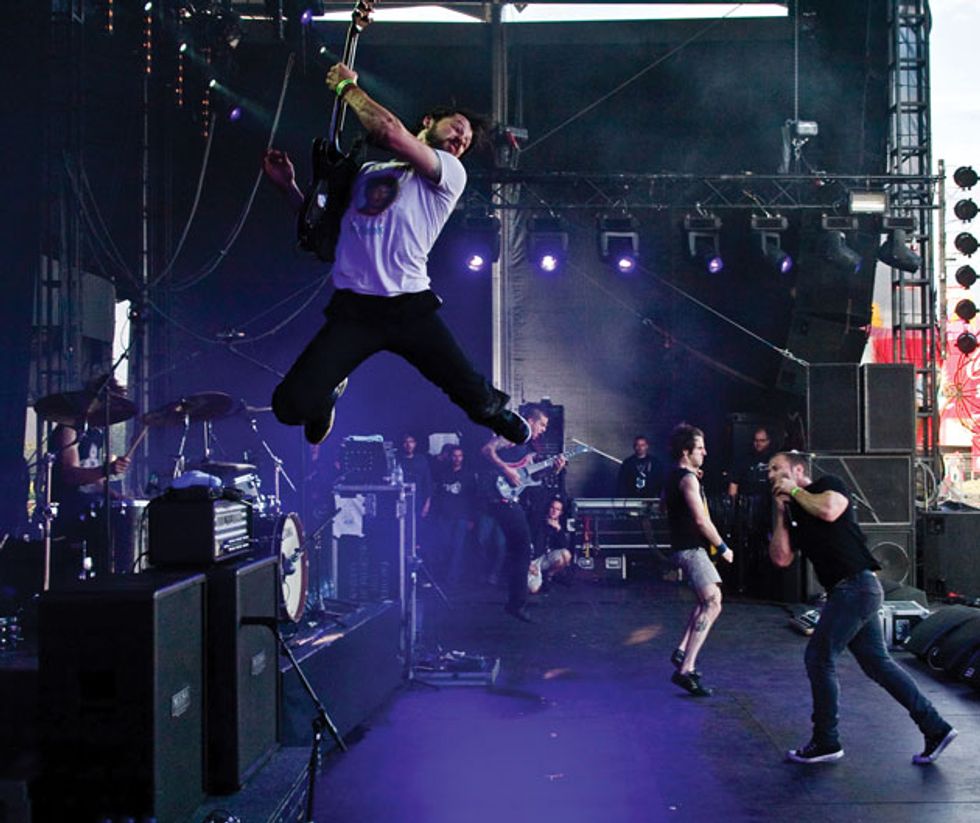
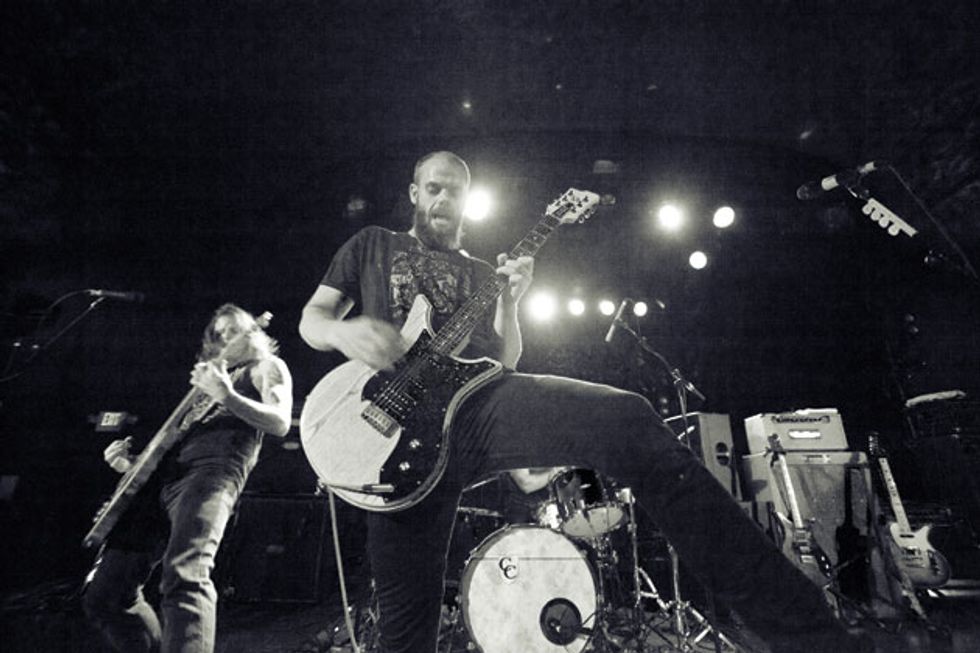
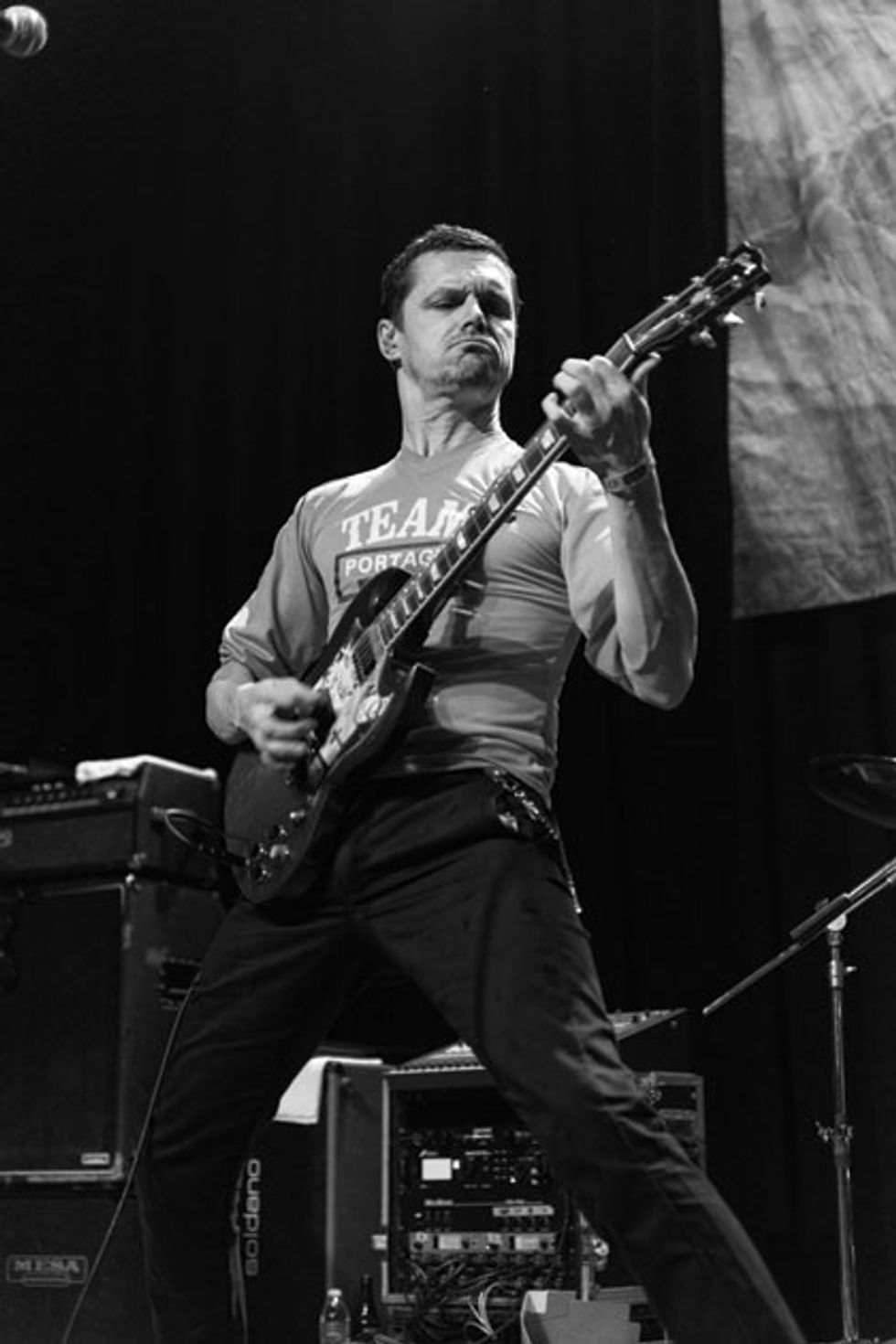
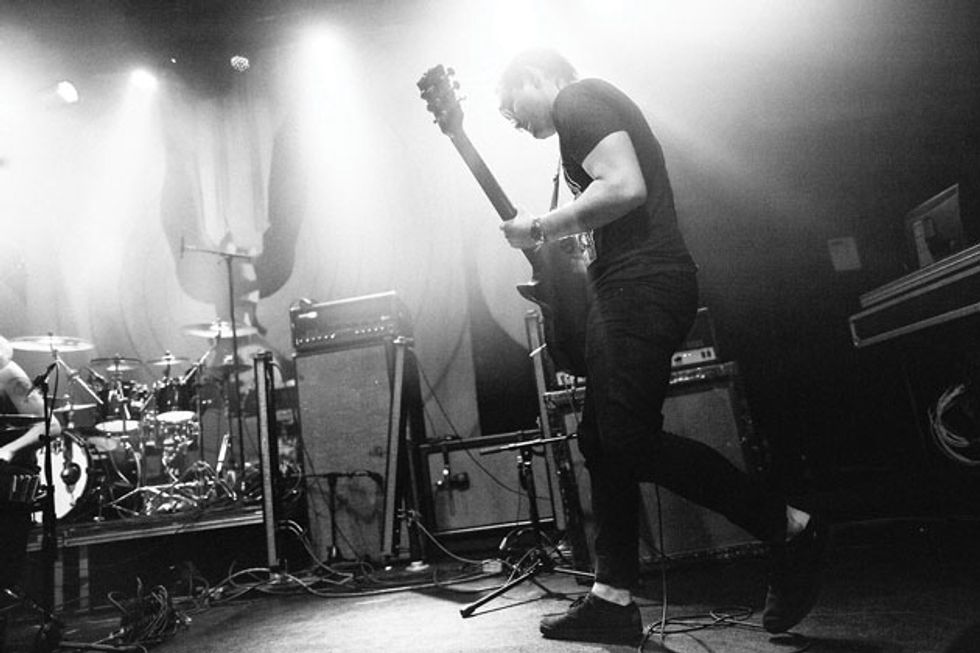
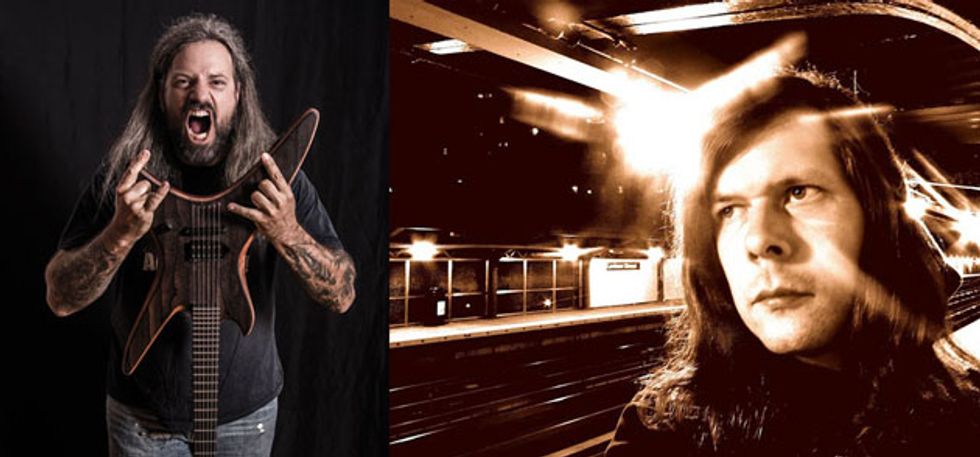
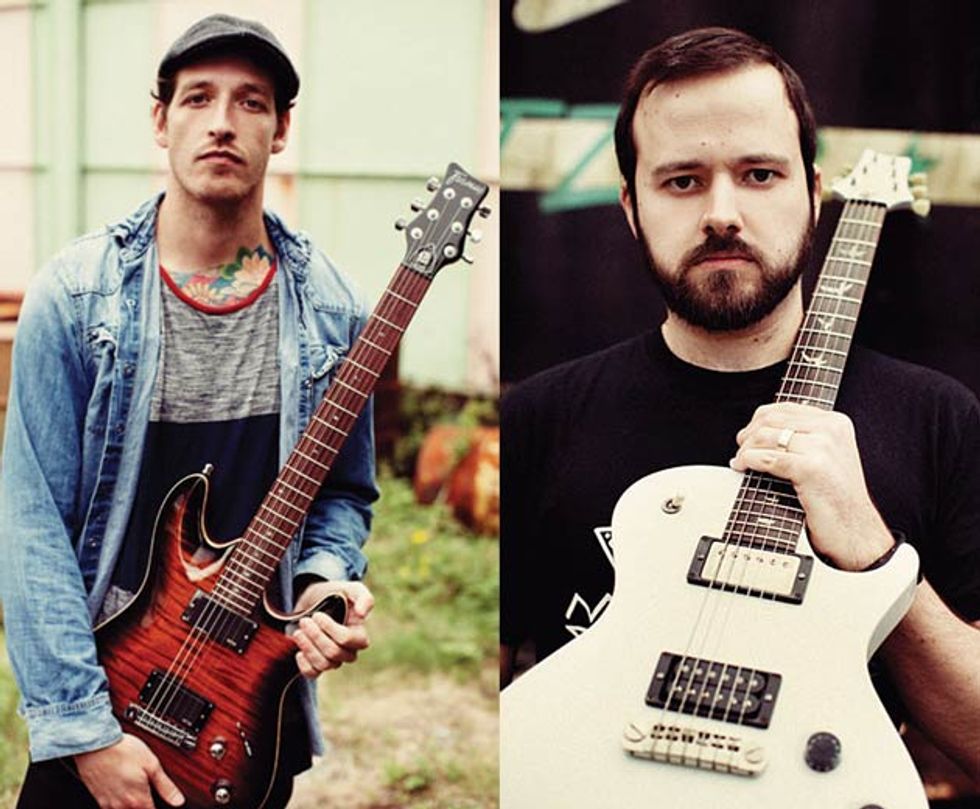







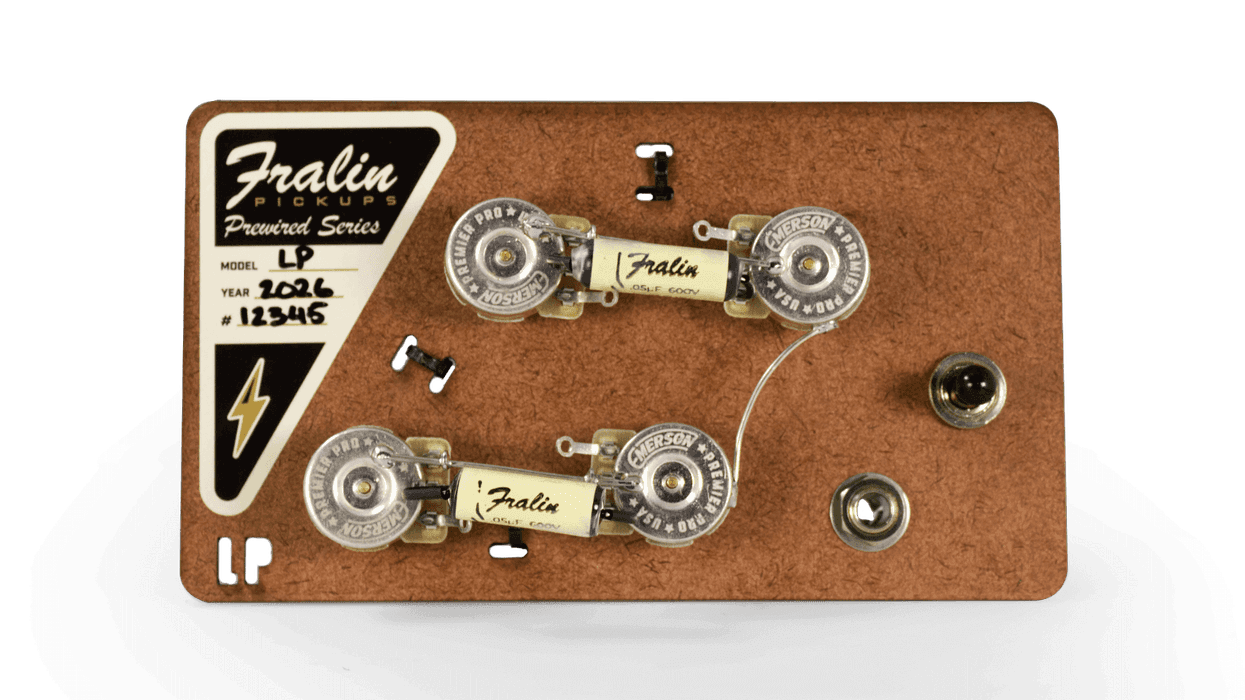


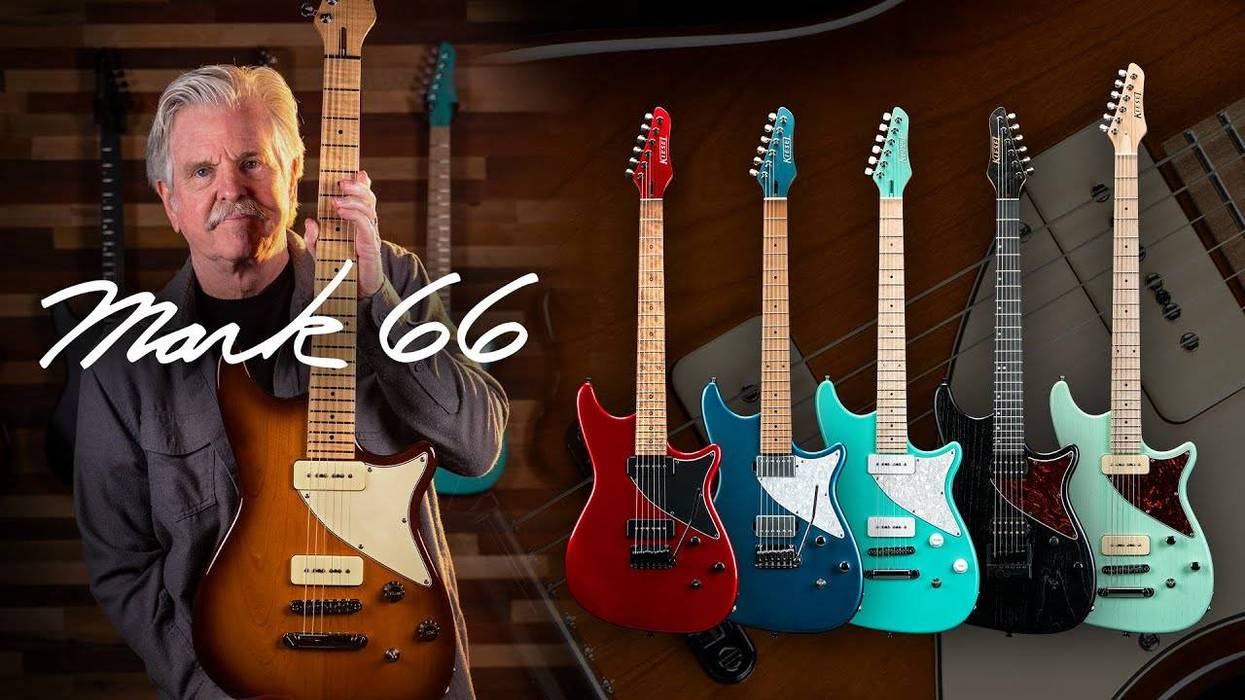



![Rig Rundown: Russian Circles’ Mike Sullivan [2025]](https://www.premierguitar.com/media-library/youtube.jpg?id=62303631&width=1245&height=700&quality=70&coordinates=0%2C0%2C0%2C0)
















![Rig Rundown: AFI [2025]](https://www.premierguitar.com/media-library/youtube.jpg?id=62064741&width=1245&height=700&quality=70&coordinates=0%2C0%2C0%2C0)











